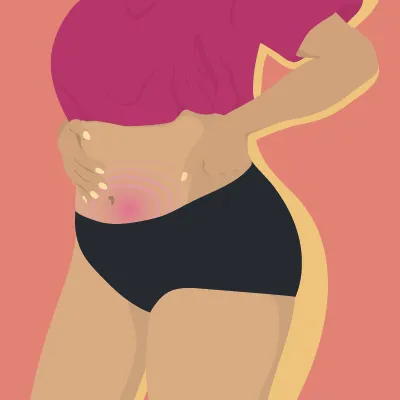Feb 06, 2020
Polycystic Ovary Syndrome (PCOS) Explained
You may have heard the term Polycystic Ovary Syndrome before, or the abbreviation of PCOS. But, what does that even mean? We’re about to give you the Libra lowdown. Let’s do this…
What is Polycystic Ovary Syndrome, and what causes it?
Basically, females and those assigned female at birth produce the hormone oestrogen, whereas males and those assigned male at birth have testosterone. Here's the plot twist: In addition to oestrogen, we have these things called androgens. (Bear with us, this can get kinda confusing). These are male hormones that females also make.
Sometimes, ovaries pump out more androgens than what's considered normal, and this is called hyperandrogenism. These high levels of male hormones can tamper with the usual ovulation process, and the imbalance can even cause some little follicles to grow off the ovaries. These follicles lead to the formation of cysts, and that's exactly where the 'cyst' part of Polycystic Ovary Syndrome comes from.
Unfortunately, the exact cause of PCOS is unknown; however, links have been made with insulin resistance, family history, as well as lifestyle.
Is PCO the same as PCOS?
You may have a friend who says they have polycystic ovaries (PCO). PCO, however, is different from PCOS. Say what?! PCO is a normal variation of an ovary and actually affects up to a third of menstruating people. They will have polycystic ovaries visible on an ultrasound, but typically no other symptoms.
PCOS, on the other hand, is a diagnosed metabolic disorder, estimated to affect 6-13% of menstruating people. The symptoms of PCOS often begin to show in teenage years and can have short and long-term impacts. To remember the difference between PCO and PCOS, think "S" for PCOS symptoms!
What are the symptoms of PCOS?
Okay, we don't have X-ray vision. But, while we can't see what's going on with our ovaries without visiting the GP, the below symptoms can act like alarm bells to signal if PCOS may be affecting our daily routines. If something's not quite right, never just put up with it.
Possible PCOS symptoms include:
-
Weight gain
-
Irregular or really heavy periods
-
Other menstrual problems, aka you might not be getting your period
-
Persistent acne that doesn't seem to clear up (no matter how many pamper sessions you throw with your besties)
-
Significantly increased hair growth on face, chest, or back
Always remember the Golden Rule of a medical diagnosis: if you're ever (even just slightly) unsure about any out-there body changes, touch base with your GP. They're the expert.
How will my Doc test for PCOS?
Your GP can use a variety of methods to find clues that can confirm or rule out Polycystic Ovary Syndrome for you:
-
Ultrasounds: Not just reserved for baby bumps. A typical PCOS ultrasound reveals a high density of cysts on the ovary, which resemble 'black holes' on a projection and are often arranged like a string of pearls. The size of one or both ovaries will also appear increased.
-
Blood test: A simple blood test can check your hormone levels. Your GP will determine if those male hormones (androgens) are in high quantity throughout your bloodstream.
Sometimes, PCOS can be tough to quickly diagnose, as it's a notoriously difficult syndrome to pin down. Why? Well, not every person with PCOS will have every symptom, and each PCOS experience can be unique.
Okay, when can a PCOS diagnosis actually be made?
A diagnosis of polycystic ovary syndrome can be made when at least two out of three of the following criteria have been detected after testing:
-
The ovaries are 'polycystic' because 20 or more follicles are visible on one ovary, or the size of one or both ovaries is increased.
-
There are high levels of male hormones showing up from blood test results, or this is suggested by unusual facial or body hair growth and acne.
-
There are significant menstrual issues, such as a lack of periods or menstrual irregularity.
What are the available treatment options for PCOS?
Good news! It's all about management when it comes to PCOS. Your GP will run you through a list of lifestyle adjustments you can make in your daily routine, such as a nutritious diet and regular physical activity.
Additionally, some medications and therapies can help treat PCOS symptoms:
Hormonal treatments:
-
The oral contraceptive pill
-
Hormones called gonadotropins
-
Testosterone-lowering drugs
Other medications:
-
Weight-loss medications
-
Insulin-sensitising drugs (like metformin)
-
Antidepressants
-
Anti-anxiety medications
Phew! That was A LOT to take in. We hope that this has given you a newfound understanding of PCOS: an often misunderstood health concern. As always, we suggest you give your GP a friendly call if this article has brought up any questions or concerns (no matter how big or small) for you.
Love Libra x
Anything else? Asaleo Care makes no warranties or representations regarding the completeness or accuracy of the information. This information should be used only as a guide and should not be relied upon as a substitute for professional, medical or other health professional advice.







